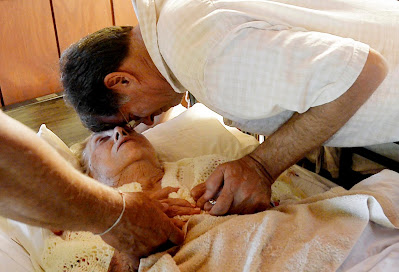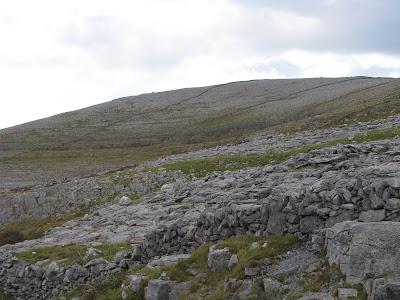Any time there is a natural, or human disaster, it makes me think; like the recent mass shootings. Think of any one of those people who died. One moment they are just getting on with their lives, at school, or at a shopping mall, then suddenly they are before God knowing what their whole life was about. That could be any of us.
If you were suddenly told, like in the Gospel, ‘This very night the demand will be made for your soul,’ what would you focus on for the rest of the day? Would you be worried about paying off bills, or loans, or about people who had done you wrong? I doubt it. I’d imagine my focus would turn to the people I love and also to wondering how I have lived my life so far. How did I use the gifts and talents that God gave me?
At the moment many people in our society—including Christians—are living as though there is no after-life, as though our life on earth is everything. At funerals I often hear people talking about the deceased as though that were it. Their existence is over. If that were so, then we might as well grab all we can and make our life as comfortable as possible, because we only have one chance. But our faith tells us something completely different. Perhaps the most important thing it tells us is that we will not find full happiness in this life, but in the next, if we choose God. Complete happiness is not to be found in this life. We will have moments of great happiness, and hopefully we will find overall contentment, but that’s about as good as it gets and that is how it is meant to be. Our focus is meant to be on the world to come, because that is our greatest hope. In the second reading St. Paul writes: ‘Think of what is above, not of what is on earth’ (Col 3:2-3). That doesn’t mean that we ignore the world around us. On the contrary, we are called to better the world around us, to love the people around us, so that when we come before God we will have something to show for it. We are meant to use our gifts and talents as best we can.
When I watch movies or documentaries about organised crime, or the drug cartels, even though I find it interesting, it also makes me sad for those people, because they are doing the exact opposite of what Jesus taught us. They are putting all their energy and skill into acquiring goods for this world, at the expense of their soul. ‘What does it profit a man to gain the whole world and lose his own soul?’ (Mark 8:36).
When Our Lady appeared to Bernadette in Lourdes 150 years ago, one of the things she said to her was, ‘I cannot promise you happiness in this life, but in the next.’ It is so important that we don’t forget what our life is really about. We are only on this earth for a short time. How we live our life on earth is very important.
In Jesus’ time the problem of greed for money was just as much of an issue as it is now and probably always will be. When this man said to Jesus, ‘Tell my brother to give me a share of our inheritance,’ straight away Jesus pointed out to the disciples the danger of this desire. He said, ‘Watch out for this.’ ‘A person’s life is not made secure by what he owns.’ The problem is that our society tells us the opposite. We are constantly being told that if we have enough of everything, we will be happy, but that is not what the Lord teaches us. That’s not where our happiness comes from.
There was a priest called Benedict Groeschel (d. 2014) from the Bronx, in New York. He was a Capuchin Franciscan and he founded the Franciscan Friars of the Renewal which is very similar to the Missionaries of Charity, founded by St. (Mother) Teresa. They live very simple lives and usually work in very poor areas. He was a great preacher and he tells the story about a man he knew, who was extremely wealthy. At a particular function this man spoke to Fr. Groeschel, and he said, ‘You know Father, I have more money than I could ever spend, or use and I would really like to be able to put it to good use.’ Fr. Groeschel suggested that he could make a donation to one of the orphanages they run, or something similar. But by the end of the evening the man still had not agreed to part with one cent. It’s as if he was possessed by his wealth. He knew he had way more than he could use, but he was still unable to part with it. He was a slave to his own money. Instead of bringing him freedom and joy, which is what we usually associate with lots of money, it had enslaved him.
In confession I have heard so many heart-breaking stories of families divided over inheritance. It is so sad, because it is not important. Of course it is not good when someone in a family is left out of what should come to them, but sooner or later we will leave it behind anyway. ‘There is no hitch on the hearse,’ as they say! Is it really worth causing such division in a family for this? When you are on your death bed, will it still matter? I suppose it is another sign that we believe we will find happiness if we have enough of everything materially. If we get the right car, house, job, furniture, etc, then we will be happy. The reality is we won’t. It is very nice to have these things, but these things won’t bring happiness because we are much deeper than this. We are body and spirit and our spirit can never be content with just material things and that is why there is always this deeper longing in us for ‘something’ although we’re often not quite sure what that something is. You could call it a God shaped hole, which only God can fill.
God has made us in such a way that we will only be fulfilled in him. It’s interesting that up to recently at least, one of the most popular areas of sales in book stores, was the occult, which is another kind of search for the spiritual. Everyone is searching, even if we are searching in the wrong place.
Our time here on earth is a time for love and service; to choose for God or not; and this is a choice that each one of us has to make individually. That is why each week we come to listen to the Word of God and to receive Jesus in the Eucharist, so that we remember what our life is about, so that we keep the right focus. Keep listening to God’s word. Make sure God is at the center. We don’t want to come before God and be able to show him a full bank account and a comfortable life-style, but nothing else. God has entrusted us with whatever gifts and talents we have been given and He expects us to use them for good, not just for our own comfort. Thank God if you have done well. It is a blessing for sure, but make sure you also use it well.
‘This very night the demand will be made for your soul; and this hoard of yours, whose will it be then?’













